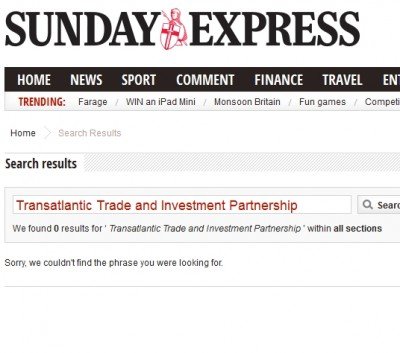TIPP is the “Transatlantic Trade and Investment Partnership” which is a new treaty being negotiated between the European Union and the US.
As onlinefocus reader Jason Richer has mentioned in comments, its not getting much coverage in the media.
For example, if you search the Daily Mail website , it has been mentioned exactly once (compared with over 1500 stories that mention Rihanna) And here’s their complete coverage:
?
BRUSSELS (AP) ? President Barack Obama says some countries have legitimate questions about whether budding free trade deals will benefit them in the long-term.
But Obama is cautioning skeptics to wait to see what’s negotiated before jumping to conclusions.
Obama is speaking at a news conference with European Union leaders in Brussels. The United States and the EU are working on the Transatlantic Trade and Investment Partnership, which seeks to remove trade barriers between the 28-nation bloc..
Obama says some suspicions about the so-called TTIP have been unjustified. He says he’s fought his entire political career for consumer and environmental protections. He says he doesn’t intend to sign legislation that would weaken those protections.
And the good old Daily Express, which normally gets into a lather about any threat to UK sovereignty, has never mentioned it at all:
If you hunt around on the web , you can find some stuff on this. John Hilary , Executive Director of War on Want writes: writes:
…..The aim is to rush through the talks as swiftly as possible with no details entering the public domain, in the hope that they can be concluded before the peoples of Europe and the USA find out the true scale of the TTIP threat.
——-
The main goal of TTIP is, by their own admission, to remove regulatory ?barriers? which restrict the potential profits to be made by transnational corporations on both sides of the Atlantic. Yet these ?barriers? are in reality some of our most prized social standards and environmental regulations, such as labour rights, food safety rules (including restrictions on GMOs), regulations on the use of toxic chemicals, digital privacy laws and even new banking safeguards introduced to prevent a repeat of the 2008 financial crisis. The stakes, in other words, could not be higher.
———
In addition to this deregulation agenda, TTIP also seeks to create new markets by opening up public services and government procurement contracts to competition from transnational corporations… Most worrying of all, TTIP seeks to grant foreign investors a new right to sue sovereign governments in front of ad hoc arbitration tribunals for loss of profits resulting from public policy decisions…
So some people on the left see this treaty as a way of driving a coach-and-horses through public safety regulations in Europe. And there is no doubt for example, that there are big differences in regulations on each side of the Atlantic. For example American eggs are currently illegal in a European supermarket, and vice versa. This article from Forbes magazine explains why:
?
Believe it or not, United States Department of Agriculture (USDA) graded eggs would be illegal if sold in the UK, or indeed anywhere in the European Union (EU). It?s all to do with the fact that commercial American eggs are federally required to be washed and sanitized before they reach the consumer. EU egg marketing laws, on the other hand, state that Class A eggs ? those found on supermarkets shelves, must not be washed, or cleaned in any way.
—–
?In Europe, the understanding is that this mandate actually encourages good husbandry on farms. It?s in the farmers? best interests then to produce to cleanest eggs possible, as no one is going to buy their eggs if they?re dirty, ? explained Mark Williams, Chief Executive, British Egg Industry Council in a phone interview.
—–
According to the USDA, despite how conscientious and thorough modern day farm-management practices might be, there will still be a small percentage of ?dirty eggs? produced. Dirt almost always equates to chicken manure and, if the eggs are produced in a free-range system, other raw agricultural commodities that hens might pick up from roaming freely.
These differences may seem fairly harmless. But people may be much more concerned about meat – the US uses growth hormones and antibiotics in its livestock much more than the EU. And how would it affect laws about cigarettes?
What would the be impact be on our local area? Hard to say. Maybe American companies tendering for council contracts? Small businesses in our area finding it easy to export to the US ? Though maybe the deal won’t happen, as the Telegraph has reported here:
?In so far as a public TTIP debate exists, EU member states are losing it,? the report said. ?There is?a risk that transatlantic trade is perceived as ?sending stuff across the ocean?, and therefore not relevant to an ordinary household or small business.?
Sources close to the negotiations say the odds are still in favour of a TTIP deal getting done, but that there is only a one-in-three chance of that deal being as effective as once hoped.



Well done for raising this, it is a very complex treaty and should have been much more prominent in the recent European Election, it did form part of the Green Party Euro Manifesto (http://greenparty.org.uk/assets/files/European%20Manifesto%202014.pdf page 9) but was not picked up by the media.
The proposed treaty will remove even more power from Member State Parliaments and Judicial Systems. It threatens to put power instead into the hands of Multi-national Companies as it will allow private companies to take action against National Governments against nationally set laws if such laws threaten the profitability of those companies.
To quote http://www.patients4nhs.org.uk/
“It will give transnational corporations the right, under ISDS, to claim massive compensation if the government introduces initiatives (including e.g. public health regulations, health protection measures, and health promotion policy) that could potentially reduce transnationals’ future profits.”
The European Public Health Alliance (http://www.epha.org/)say
“contains vague and highly technical clauses that compromise a given EU Member State’s right to regulate and for international firms to sue a Member State for perceived ’anti-free trade’ regulation.”
So although it may remove some barriers to trade it would seem to be at the price of levelling down protections and removal of direct government intervention through law making.
St Farage will have this all sorted out when he’s in No 10….
I did have an e.mail some time ago regarding this treaty with an on line petition to stop it because of the very fears raised above. It was the first I had heard of it and indeed it seems to have dropped completely below the radar since.
Trouble is if the normal media outlets are not giving it much if any coverage then how do the public ever know it is anything other than just another trade agreement.
Admin, there is a typo in your header of this post. It should be TTIP not TIPP
Thank you Greenbelt,
As Capt. Mainwaring used to say “I was wondering who’d be the first to spot that”
It’s amended now.